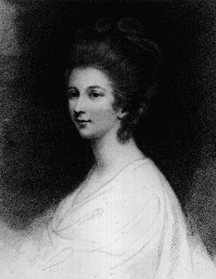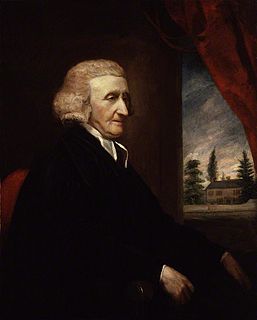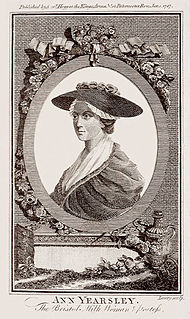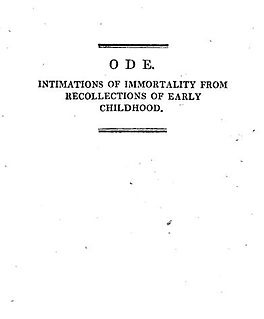Related Research Articles

William Wordsworth was an English Romantic poet who, with Samuel Taylor Coleridge, helped to launch the Romantic Age in English literature with their joint publication Lyrical Ballads (1798).
This article contains information about the literary events and publications of 1810.

Richard Watson Dixon, English poet and divine, son of Dr James Dixon, a Wesleyan minister.

Charlotte Lennox, néeRamsay, was a Scottish novelist, playwright and poet, mostly remembered today as the author of The Female Quixote, and for her association with Samuel Johnson, Joshua Reynolds and Samuel Richardson. However, she had a long career in her own right.

Mary Robinson was an English actress, poet, dramatist, novelist, and celebrity figure. She lived in England, in the cities of Bristol and London; she also lived in France and Germany for a time. She enjoyed poetry from the age of seven and started working, first as a teacher and then as actress, from the age of fourteen. She wrote many plays, poems and novels. She was a celebrity, gossiped about in newspapers, famous for her acting and writing. During her lifetime she was known as "the English Sappho". She earned her nickname "Perdita" for her role as Perdita in 1779. She was the first public mistress of King George IV while he was still Prince of Wales.

Henry James Pye was an English poet, and Poet Laureate from 1790 until his death. His appointment owed nothing to poetic achievement, and was probably a reward for political favours. Pye was merely a competent prose writer, who fancied himself as a poet, earning the derisive label of poetaster.

Richard Graves was an English cleric, poet, and novelist. He is remembered especially for his picaresque novel The Spiritual Quixote (1773).

Helen Maria Williams was a British novelist, poet, and translator of French-language works. A religious dissenter, she was a supporter of abolitionism and of the ideals of the French Revolution; she was imprisoned in Paris during the Reign of Terror, but nonetheless spent much of the rest of her life in France. A controversial figure in her own time, the young Williams was favourably portrayed in a 1787 poem by William Wordsworth.

Ann Yearsley, née Cromartie, was an English poet and writer from a lowly social background. The poet Robert Southey wrote a biography of her.
Hannah Brand (1754–1821) was an English actress, poet and playwright. After her brief theatrical career, she became a governess.
Nationality words link to articles with information on the nation's poetry or literature.
Nationality words link to articles with information on the nation's poetry or literature.
Richard Polwhele was a Cornish clergyman, poet and historian of Cornwall and Devon.

"Ode: Intimations of Immortality from Recollections of Early Childhood" is a poem by William Wordsworth, completed in 1804 and published in Poems, in Two Volumes (1807). The poem was completed in two parts, with the first four stanzas written among a series of poems composed in 1802 about childhood. The first part of the poem was completed on 27 March 1802 and a copy was provided to Wordsworth's friend and fellow poet, Samuel Taylor Coleridge, who responded with his own poem, "Dejection: An Ode", in April. The fourth stanza of the ode ends with a question, and Wordsworth was finally able to answer it with seven additional stanzas completed in early 1804. It was first printed as "Ode" in 1807, and it was not until 1815 that it was edited and reworked to the version that is currently known, "Ode: Intimations of Immortality".
Mary Collier was an English poet, perhaps best known for her poetic riposte to Stephen Duck, The Woman's Labour.

Sir James Bland Lamb, 1st Baronet, born James Burges and known as Sir James Burges, Bt, between 1795 and 1821, was a British author, barrister and Member of Parliament.
Helen Craik was a Scottish poet and novelist, and a correspondent of Robert Burns. She praised him for being a "native genius, gay, unique and strong" in an introductory poem to his Glenriddell Manuscripts.

Romanticism was an artistic, literary, and intellectual movement that originated in Europe toward the end of the 18th century. Scholars regard the publishing of William Wordsworth's and Samuel Coleridge's Lyrical Ballads in 1798 as probably the beginning of the movement, and the crowning of Queen Victoria in 1837 as its end. Romanticism arrived in other parts of the English-speaking world later; in America, it arrived around 1820.
Thomas Warwick was a poet and unbeneficed clergyman of Cornish origin, born about 1755, died after 1785. He took part in the revival of the sonnet form at the end of the 18th century and his other writing included odes and poems on mediaeval subjects. His behaviour was described as eccentric and he died early in a carriage accident.